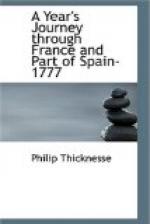the poorest peasants; whose tattered habits, wretched
houses, and smiling countenances, convinced me, that
chearfulness and contentment shake hands oftener under
thatched than painted roofs. We found one of these
villagers as ready to boil our tea-kettle, provide
butter, milk, &c. as we were for our breakfasts; and
during the preparation of it, I believe every man,
woman, and child of the hamlet, was come down to look
at us; for beside that wonderful curiosity common
to this whole nation, the inhabitants of this village
had never before seen an Englishman; they had heard
indeed often of the country, they said, and that it
was un pays tres riche. There was such
a general delight in the faces of every age, and so
much civility, I was going to say politeness, shewn
to us, that I caught a temporary chearfulness in this
village, which I had not felt for some months before,
and which I intend to carry with me. I therefore
took out my guittar, and played till I set the whole
assembly in motion; and some, in spite of their wooden
shoes, and others without any, danced in a manner
not to be seen among our English peasants. They
had “shoes like a sauce-boat,” but no “steeple-clock’d
hose.” While we breakfasted, one of the
villagers fed my horse with some fresh-mowed hay,
and it was with some difficulty I could prevail upon
him to be paid for it, because the trifle I offered
was much more than his Court of Conscience
informed him it was worth. I could moralize here
a little; but I will only ask you, in which state think
you man is best; the untaught man, in that of nature,
or the man whose mind is enlarged by education and
a knowledge of the world? The behaviour of the
inhabitants of this little hamlet had a very forcible
effect upon me; because it brought me back to my earlier
days, and reminded me of the reception I met with
in America by what we now call the Savage Indians;
yet I have been received in the same courteous manner
in a little hamlet, unarmed, and without any other
protection but by the law of nature, by those savages;—indeed
it was before the Savages of Europe had instructed
them in the art of war, or Mr. Whitfield had preached
methodism among them. Therefore, I only
tell you what they were in 1735, not what they
are at present. When I visited them, they
walked in the flowery paths of Nature; now, I fear,
they tread the polluted roads of blood. Perhaps
of all the uncivilized nations under the sun, the
native Indians of America were the most humane;
I have seen an hundred instances of their humanity
and integrity;—when a white man was under
the lash of the executioner, at Savannah in Georgia,
for using an Indian woman ill, I saw Torno Chaci,
their King, run in between the offender and the corrector,
saying, “whip me, not him;”—the
King was the complainant, indeed, but the man deserved
a much severer chastisement. This was a Savage
King. Christian Kings too often care not
who is whipt, so they escape the smart.




